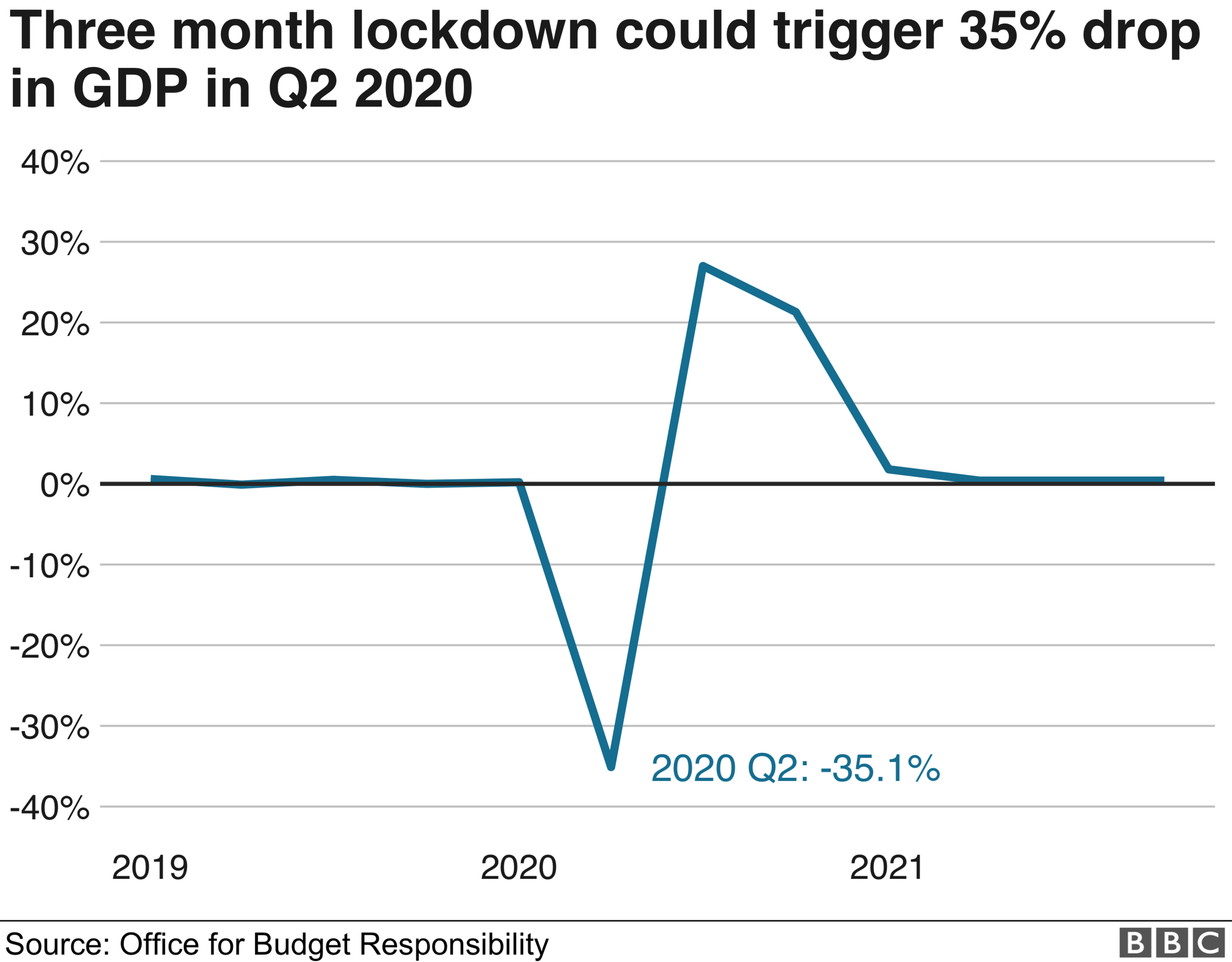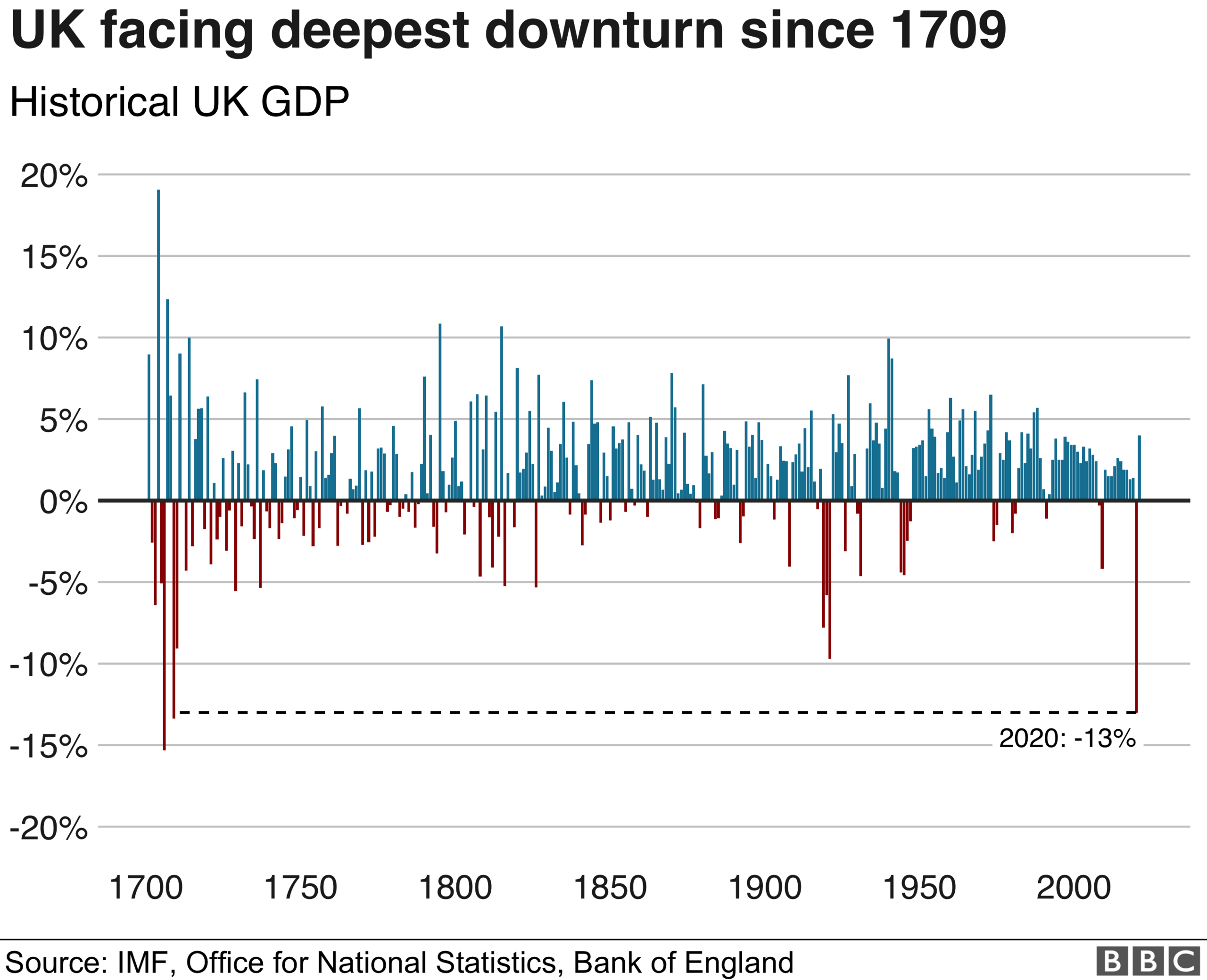Chancellor Sunak warns of 'tough times' for UK economy
- Published
- comments
Chancellor: Coronavirus will have "very significant impact" on economy
A forecast by the UK's tax and spending watchdog suggests the coronavirus crisis will have "serious implications" for the UK economy, Chancellor Rishi Sunak has said.
The Office for Budget Responsibility (OBR) warned the pandemic could see the economy shrink by a record 35% by June.
Mr Sunak stressed that the forecast was only one possible scenario.
But he said it was important that the government was "honest with people about what may be happening".
He said the OBR figures suggest that the scale of what the UK is facing "will have serious implications for our economy", in common with other countries.
"These are tough times, and there will be more to come," Mr Sunak said.
However, he said that while the government could not protect every business and household, "we came into this crisis with a fundamentally sound economy, powered by the hard work and ingenuity of the British people and British businesses."
The OBR also expects the economic impact of the crisis to be temporary, he said.
He added that the government is "not just going to stand by" and not act to support the economy.
"Our planned economic response is protecting millions of jobs, businesses, self-employed people, charities, and households," he said.
"Our plan is the right plan."
Mr Sunak added that at the moment "the single most important thing we can do to protect the economy is to protect the health of our people."

The OBR said a three-month lockdown followed by three months of partial restrictions would trigger an economic decline of 35.1% in the quarter to June alone, following growth of 0.2% in the first three months of this year.
Robert Chote, the chairman of the OBR, said a drop of this magnitude would be the largest "in living memory".
While the UK economy would contract by 12.8% this year under this scenario, it is expected to get back to its pre-crisis growth trend by the end of 2020.
The OBR stressed the actual amount of growth would depend on how long the lockdown lasted, as well as how quickly activity bounced back once restrictions were relaxed.
In any case, it expects half of any sharp drop in growth in the second quarter to be reversed in the three months to September as the economy starts to recover.
Separately, the International Monetary Fund warned the virus would push the UK into its deepest slump for a century.
In its report, the IMF said it expects the UK economy to shrink by 6.5% in 2020, while the global economy will contract by 3%.
Coronavirus-related deaths in UK hospitals have risen to 12,107, an increase of 778 on Monday's total.
And more than one in five deaths in England and Wales is linked to coronavirus, figures show.
The Office for National Statistics data showed the virus was mentioned on 3,475 death certificates in the week ending 3 April.
It helped push the total number of deaths in that week to more than 16,000 - a record high and 6,000 more than expected at this time of year.

'Unprecedented financial help'
The OBR's estimates said a three month lockdown would push up the UK's borrowing bill to an estimated £273bn this financial year, or 14% of gross domestic product (GDP).
This would represent the largest deficit as a share of GDP since World War Two.
While borrowing is expected to jump, the OBR said the government's unprecedented financial help for workers and businesses would help to limit any long-term damage.
The OBR expects a more lasting impact on unemployment, which is estimated to rise by 2.1 million to 3.4 million by the end of June.
Under this scenario, unemployment would hit 10%, from its current 3.9% rate, before easing to around 7.3% at the end of the year.
The jobless rate is expected to remain elevated until 2023, when it is expected to drop back to 4%, in line with the OBR's March forecast.


These are incredible numbers indicated by the government's official, though independent, forecasters at the OBR.
They illustrate what is at stake, and why the government has to get its economic rescue plans spot on. They will feature at the COBR discussions. Indeed some senior public health experts believe that the government needs an economic counterpart to the influential SAGE committee of scientists.
But this isn't quite about a direct trade off. That existed clearly on the way in - the economy was shut down to protect public health. On the way out of these measures, the balance is not straightforward.
If the lockdown is lifted prematurely, the health system could fall over, workers might just refuse to go to work anyway, and none of that would be positive for the economy.
Indeed when it is lifted, the absence of a vaccine means that these trade offs are likely to be considered week by week and sector by sector, for months to come.

Hit to public finances
The OBR expects UK debt to be higher for years to come, with extra borrowing expected to push Britain's debt share to above 100% of GDP this financial year if the lockdown lasts for three months.
While this will drop sharply as the UK economy recovers, public debt is expected to remain at 84.9% of GDP in four years time, much higher than the 75.3% forecast in the March Budget.
Mr Chote said a longer lockdown could have more serious consequences for the economy.
He said: "The longer the lockdown goes on, the more likely it is that the future potential of the economy is scarred by business failures, by less business investment and by the unemployed finding it harder to get back into the labour market."
However, the OBR stressed that the restrictions were necessary to protect the economy from a more prolonged slowdown.
It said extra spending by the Treasury to support the economy would also limit the economic damage.
"The government's policy response will have substantial direct budgetary costs, but the measures should help limit the long-term damage to the economy and public finances - the costs of inaction would certainly have been higher," the OBR said.

A SIMPLE GUIDE: How do I protect myself?
AVOIDING CONTACT: The rules on self-isolation and exercise
WHAT WE DON'T KNOW How to understand the death toll
TESTING: Can I get tested for coronavirus?
LOOK-UP TOOL: Check cases in your area

It added that while the lockdown was the main constraint on economic activity, relaxing these measures too soon would cause greater damage.
"The reason why most of the short-term economic impact comes from these measures is that they are successful in limiting the spread of the disease.
"If the measures were not stringent enough to control the disease, then the economic impact from illness would be that much greater."